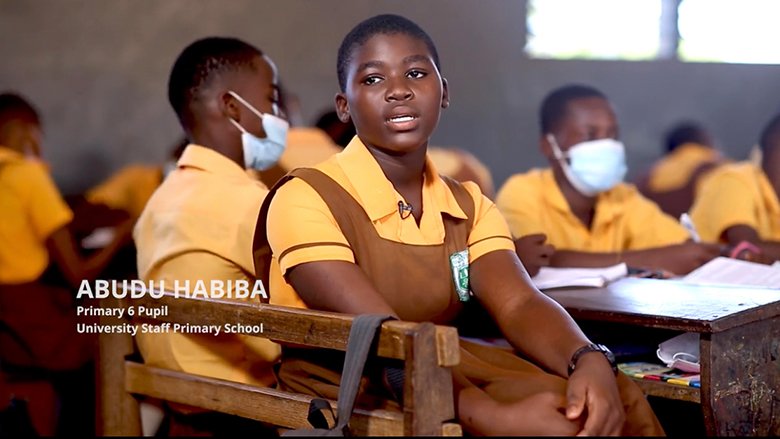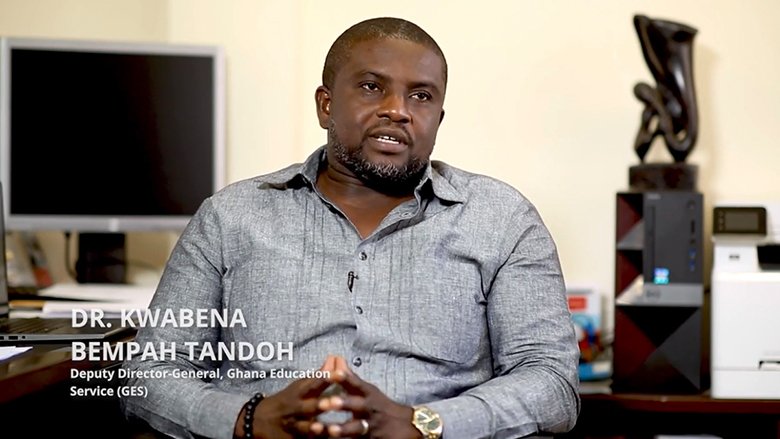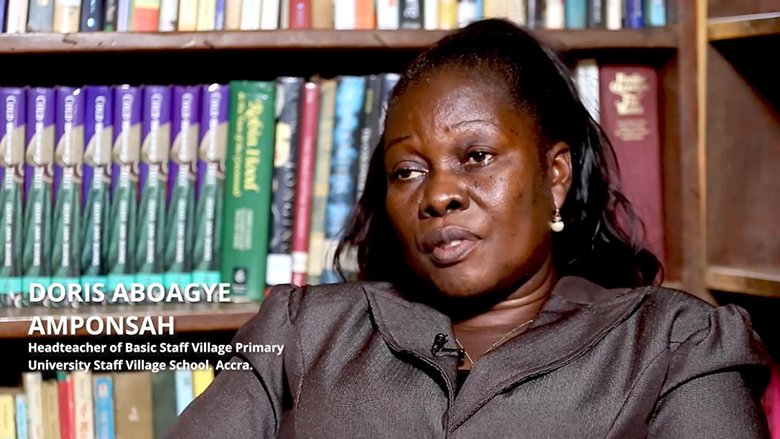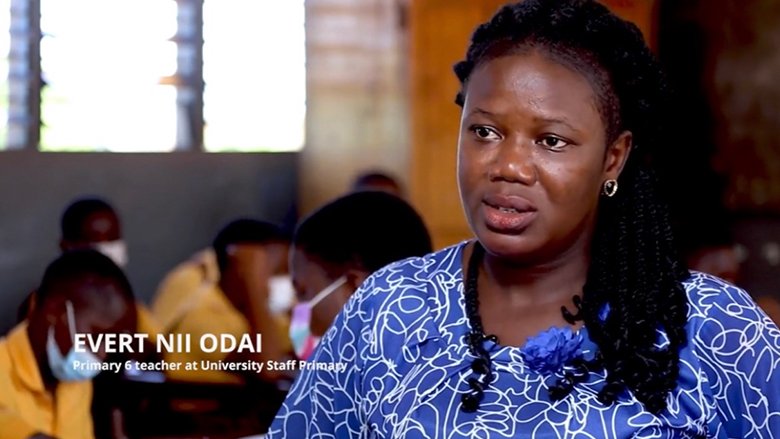Challenge
The onset of the COVID-19 pandemic in 2020 threatened to reverse the hard-earned gains in access to schooling and improved learning in Ghana. Schools in Ghana closed for 10 months, starting in March 2020, when the first cases of COVID-19 were detected in the country. This situation affected an estimated 9.2 million students in kindergarten, primary, lower, and upper secondary schools, as well as the 0.5 million tertiary education students. In addition, it impacted the 450,000 teachers in the public and private educational institutions.
In response to the pandemic, the Ministry of Education and the Ghana Education Service (GES) — the agency responsible for implementing policies to ensure that school-age Ghanaians receive an education — introduced remote and distance learning programs, including the distribution of learning packages to school children. This response faced the additional challenge of variable access to communications technologies across geographic and socioeconomic status, particularly impacting children in poor and rural households.
Approach
The GALOP supported Ghana’s COVID-19 Coordinated Education Response Plan during the extended school closure, ensuring sanitization and safety of schools, while also working to build a resilient education system. The project launched distance learning via TV, radio, and online channels. It supported the distribution of printed materials to support home learning. In addition, it provided for community-based, complementary basic education classes.
The project also helped to launch the Edmodo Learning Management System, which created a platform that enabled all schools, students, and teachers to connect remotely. Furthermore, to support remedial and accelerated learning that accompanied the reopening of schools in early 2021, the project supported in-service teacher training for targeted instruction and rapid student assessment to over 70,000 teachers (41 percent of whom are women) in 10,000 beneficiary schools. As the school shutdown was drawing to a close, the project supported back-to-school campaigns. These included radio and TV messages by education managers and practitioners in various languages, encouraging students to return to school.
Results
The project worked in several ways to reduce learning losses caused by the COVID-19 pandemic, including by leveraging digital technologies, enabling safe school reopening, as well as supporting back-to-school campaigns. The major results included:
- More than 1,600 lessons were developed to students across the country using distance learning modules. These lessons included 1,201 lessons for Ghana Learning TV, a virtual classroom produced by the Ghanaian government, with 975 video lessons uploaded to the Ghana Online Library.
- Printed teaching and learning materials were distributed to 2.9 million children during the school closures to mitigate the effects of poor or limited access to TV, radio or other technologies between December 2020 and February 2021.
- The Edmodo Learning Management System, which provides a platform for online learning and encourages communication between teachers, students, and parents, was launched during the National Education Week on November 5, 2020. More than 35,000 students were registered in the Learning Management System. As of August 2021, the system had a weekly usership of 540 individual users, 6,241 classes (teachers and classes), and 202 informal groups. At the kindergarten, primary and higher secondary levels, more than 10,000 public and 6,000 private schools were registered on the Learning Management System. At the higher secondary level, 630 public schools and 285 private schools were registered.
- Devices pre-loaded with educational content were deployed to 3,000 students in special-needs schools located in various regions of Ghana.
- To address the learning gap resulting from and exacerbated by the shutdown, training in providing targeted instruction was conducted for over 70,000 teachers between December 2020 and February 2021. The project supported the launch of targeted instruction, rapid student assessments, and remedial education programs for 5,000 schools (covering about 5.8 million students).
- When schools reopened in January 2021, close to 100 percent of all students who were previously in school returned to school, thus reflecting the success of the back-to-school campaigns.
- The program implemented interventions to provide additional hand-washing facilities. It also supported the drilling of 100 boreholes to provide access to clean water in selected basic schools in the program areas.
World Bank Group Contribution
The GALOP was funded by IDA in the amount of $150 million, as well as a Global Partnership for Education (GPE) Education Sector Plan Implementation Grant ($23.9 million). The GALOP additional financing consisted of COVID-19 Accelerated Financing in the amount of $14.8 million from the GPE, as well as $25.5 million from the Ghana Education Outcomes Fund, originating from the Global Partnership for Results Based Approaches (GPRBA) Trust Fund. The government is also contributing $4.5 million. The COVID-19 Accelerated Financing specifically supported the strengthening of remote education service delivery, including distance learning; safe school reopening and reentry; and the strengthening of management to strengthen education sector resilience.
Partners
The GALOP was prepared with a joint team of representatives from the Ministry of Education, the GES, the Center for Distance Learning and Open Schooling, the National Teaching Council, and the Ghana Library Authority. In addition, there is a strong partnership among key development partners in Ghana’s education sector, including the United States Agency for International Development (USAID), the United Nations Children’s Fund (UNICEF), the United Kingdom's Foreign Commonwealth and Development Office (FCDO), and the Japan International Cooperation Agency (JICA). Weekly and bi-weekly meetings with the Ministry of Education, the GPE, and development partners during the COVID-19 pandemic allowed partners in the education sector to coordinate their support for the Government’s COVID-19 Coordinated Education Response Plan. It also enable them to receive feedback from the Government about implementation issues and developments.
Looking Ahead
In future, there is a need to harmonize policies concerning the use of digital devices in basic education schools. This would help to ensure an enabling policy environment, as well as the sustainability of distance education. The World Bank is supporting the Government of Ghana in: (i) reviewing policies concerning technology use in schools; (ii) conducting rapid surveys concerning teacher and student accessibility to internet and digital technology; and (iii) developing an operational plan to expand internet connectivity to all basic education schools. These activities are supported by Trust Funds, as well as pipeline operations, including the Ghana Digital Acceleration Project (P176126) approved in April 2022.



